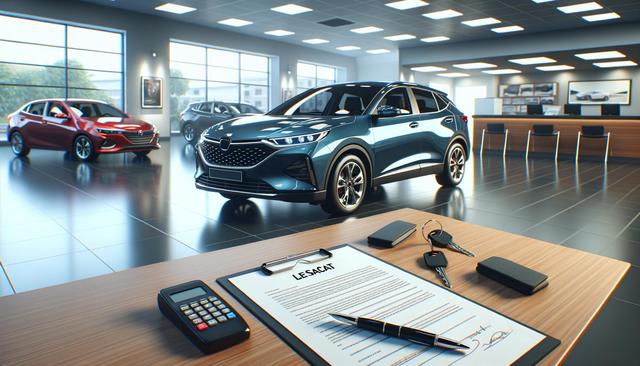Understanding Car Leases: How They Work
Leasing a vehicle has become an increasingly popular option for drivers who want flexibility and convenience. Unlike traditional financing, car leases allow you to use a vehicle for a set term—typically 24 to 36 months—while making monthly payments based on the car’s depreciation during that time. When the lease ends, you can return the vehicle, purchase it, or lease a new one. This approach is particularly attractive to those who prefer driving newer models with the latest features without the long-term commitment of ownership.
One of the appealing aspects of leasing is the opportunity to drive a newer vehicle more frequently. For drivers interested in a Hyundai, leasing offers a chance to enjoy modern safety features, updated technology, and improved fuel efficiency every few years. Additionally, lower upfront costs and often lower monthly payments compared to financing make leasing a practical choice for budget-conscious consumers.
Benefits of Leasing a Hyundai
Considering a Hyundai for your next vehicle opens up a range of leasing benefits that align well with many drivers’ needs. Hyundai vehicles are known for their reliability, comfort, and innovative features, making them a smart option for leasing. Whether you’re commuting daily or taking weekend road trips, the variety of available models fits diverse preferences and lifestyles.
Key advantages of leasing a Hyundai include:
- Access to newer models more frequently
- Lower repair costs due to manufacturer warranties
- Flexible lease terms and mileage limits
- Lower monthly payments compared to financing
Hyundai lease agreements are usually accompanied by comprehensive warranty coverage, reducing concerns about unexpected repair costs. This makes leasing especially attractive to those who value peace of mind and predictable expenses. Plus, the flexibility in lease structures ensures you can select terms that align with your driving habits and financial goals.
Customizing Lease Terms to Fit Your Lifestyle
One of the most important things to consider when leasing a vehicle is choosing lease terms that match your driving patterns. Lease agreements are customizable, allowing you to select the duration of the lease and the annual mileage limit. This is especially beneficial for those who know their expected driving range, such as city commuters or occasional long-distance travelers.
Typical car lease terms include:
- 24, 36, or 48-month durations
- Mileage options ranging from 10,000 to 15,000 miles annually
- Options to purchase the vehicle at the end of the lease
When leasing a Hyundai, you have the flexibility to choose terms that best suit your routine. For example, if you mostly drive locally and don’t rack up many miles, a lower mileage lease might help you save on monthly payments. On the other hand, if you drive frequently for work or travel, higher mileage allowances are available to accommodate your lifestyle.
Costs and Considerations Before Leasing
While leasing can offer numerous advantages, it’s important to understand the associated costs and responsibilities. Upfront payments, monthly lease fees, and potential end-of-lease charges should be factored into your decision. Knowing what’s expected at the beginning, during, and end of the lease helps avoid surprises and ensures the lease works within your budget.
Here are some key financial aspects to consider:
- Initial payment (often called a capitalized cost reduction)
- Monthly lease payments based on agreed terms
- Possible fees for excess mileage or wear and tear
- Disposition fees at the end of the lease term
When leasing a Hyundai, dealers often provide detailed breakdowns of these costs upfront. It’s also a good idea to inquire about any lease specials or promotions that could make your deal more affordable. Leasing can be a cost-effective way to drive a vehicle with modern features, but it’s important to understand your obligations and how they align with your financial situation.
What Happens at the End of Your Lease?
The end of a lease term presents several options, giving flexibility for your next vehicle decision. If you’ve enjoyed your Hyundai and want to keep it, many lease agreements offer a buyout option, allowing you to purchase the car for a predetermined amount. Alternatively, you can return the vehicle and choose a different model to lease or purchase.
As your lease ends, you can expect the following steps:
- Vehicle inspection for wear and tear
- Review of mileage usage
- Settlement of any outstanding fees
- Option to lease a new vehicle or buy the current one
Leasing a Hyundai offers the advantage of flexibility at lease-end, especially if your needs or budget have changed. Whether you want to upgrade to a newer model or transition to ownership, the process is generally smooth and supported by clear terms outlined at the start of the lease. This flexibility makes leasing an attractive path for those who appreciate having choices once the lease concludes.
Conclusion: Is Leasing the Right Move for You?
Leasing can be a smart and practical option for drivers looking to enjoy modern vehicle features with manageable financial commitments. If you’re considering a Hyundai for your next vehicle, leasing offers a flexible way to experience the brand’s well-regarded performance, safety, and innovation. With customizable terms and mileage options, you can tailor the lease to fit your lifestyle and budget.
Before making a decision, weigh your driving habits, financial goals, and long-term vehicle needs. A lease might be ideal if you prefer lower monthly payments, less commitment, and access to new cars more frequently. For many drivers, especially those interested in the dependability and value Hyundai offers, leasing could be a well-suited choice.




Leave a Reply